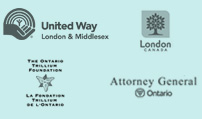Herstory
On June 1, 1973, the London Women’s Resource Centre (LWRC) opened with funding from the Opportunities for Youth grant. Initial activities included the development of a library, and workshops for women about issues such as assertiveness, equal opportunity and day care. Women involved in LWRC developed ideas for services needed by women in the London area. One of the important issues raised was the prevalence of sexual violence and the need for specific services to address this issue and support women affected.
Several organizations grew from this focused effort and gained their own autonomy including Big Sisters of London, Womanpower, Women’s Community House, and Sexual Assault Centre London (SACL). At the same time, rape crisis centres were being developed across Canada to provide information, validation and referral to women at the time of assault and going forward.
Sexual Assault Centre London was established in April 1975. Initially, most of the services were provided by volunteers who had a strong commitment to supporting women who too often were blamed for their own victimization. From the beginning, the organization viewed violence against women as a larger societal problem, and services were provided from a feminist perspective. Strong working relationships were established with the London Police, Office of the Crown Attorney and the London hospitals. In May 1984, the Crisis Line became a member of the Ontario Coalition of Rape Crisis Centres. In February 1985, the Sexual Assault Crisis Line became incorporated as a separate body from the London Women’s Resource Centre, the name was changed to the Sexual Assault Centre London and a Board of Directors was formed. The first permanent staff position was created in 1986 to assist in the operation of the centre, and additional staff were added to the collective structure.
Currently, SACL consists of a staff team in addition to the more than 60 volunteers who provide support on the 24-hour Crisis and Support line (which fields calls from both female and male survivors of sexual violence), in addition to working with public education, outreach, advocacy, and support. SACL works in cooperation with many community organizations in the ongoing struggle to end violence against women.
Policies
Check out our official policies on the following topics:









